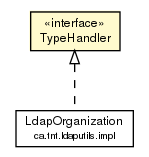
|
||||||||||
| PREV CLASS NEXT CLASS | FRAMES NO FRAMES | |||||||||
| SUMMARY: NESTED | FIELD | CONSTR | METHOD | DETAIL: FIELD | CONSTR | METHOD | |||||||||

public interface TypeHandler
Handler interface for handling Class types that the default annotation processor for LPA does not support
MINOR TypeHandler simplification (issue-12) Created : 13-Dec-2010 12:26:00 AM MST
| Method Summary | |
|---|---|
List |
getValues(Class classType,
Class refType,
Object instance)
Processes LdapEntity objects for the given classType, and return them in a list, for binding or updating. |
Object |
processValues(List list,
Class refType)
Processes LdapEntity objects for the given classType. |
| Method Detail |
|---|
Object processValues(List list,
Class refType)
Map
aggregateField
The type handler MUST handle ALL collection types that LdapEntity
aggregates are stored in, except List, SortedSet, or
native java arrays. If it does not, the data simply won't be stored in
the object. The data will then either be whatever your default
constructor sets it to, or null. YOUR PROBLEM, not ours. ;)
list - the data that we need to put into a Collection of some
sort.refType - the type of the field
List getValues(Class classType,
Class refType,
Object instance)
classType - the Class of the field that we're trying to handle.refType - the type of the fieldinstance - the instance of the field, might be a collection, or
some other type
|
||||||||||
| PREV CLASS NEXT CLASS | FRAMES NO FRAMES | |||||||||
| SUMMARY: NESTED | FIELD | CONSTR | METHOD | DETAIL: FIELD | CONSTR | METHOD | |||||||||
This documentation is part of the LDAP Persistence API (LPA).
Copyright Trenton D. Adams <lpa at trentonadams daught ca>
LPA is free software: you can redistribute it and/or modify it under the terms of the GNU Lesser General Public License as published by the Free Software Foundation, either version 3 of the License, or (at your option) any later version.
LPA is distributed in the hope that it will be useful, but WITHOUT ANY WARRANTY; without even the implied warranty of MERCHANTABILITY or FITNESS FOR A PARTICULAR PURPOSE. See the GNU Lesser General Public License for more details.
You should have received a copy of the GNU Lesser General Public License along with LPA. If not, see GNU Licenses.
See the COPYING file, in the git repository, for more information.